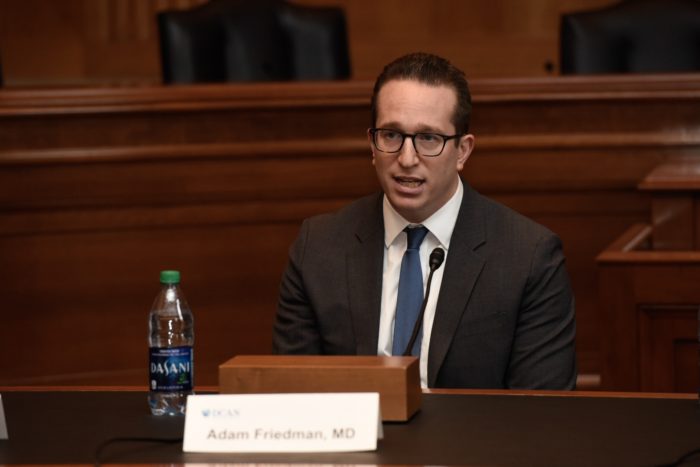Capitol Hill Event Spotlights Step Therapy
November 20, 2018
Devastating. Awful. Miserable. That’s how patients and advocates described step therapy during a recent Derma Care Access Network policy panel on Capitol Hill.

Often called “fail first,” step therapy occurs when a health plan requires patients to try – and fail – on older or lower-cost treatments before getting the medication their doctor prescribed.
Patient Experience
When panelist Sarah Hager was prescribed a targeted therapy for her psoriasis, Hager’s insurer demanded she try two other medicines first. Neither worked. Frustrated, Hager continued “hiding” her skin while she waited for health plan approval.

Hager finally got the medicine her doctor had prescribed. It was effective, and, after years of battling psoriasis, she found relief. But that relief was short-lived.
When Hager changed jobs several months later, her insurer changed too. “Back to square one,” she recalled. This insurer also required her to try several other medicines as part of step therapy. Even though she had tried them previously. Even though she and her dermatologist knew they wouldn’t work for her. Even though she had only just – finally – gotten her psoriasis under control.
Panelist Cara Ellis recalled similar frustrations with her own step therapy experience. Her son Walker was born with eczema, initiating “a struggle from day one,” Ellis recalled. Her insurer required step therapy for the medication the family’s pediatrician prescribed. So for six months, Ellis treated her son with a series of creams dictated by the health plan – to no avail. The period was “miserable,” Ellis explained.

“As a new parent, it’s devastating,” Ellis described. “You want nothing more than for your child to be comfortable. To be better. To be well. And they can’t be better if they’re suffering.”
When little Walker finally got the medication prescribed, he had “instant success.” That brought him and his parents relief. But it also underscored how futile the step therapy process – and the pain it imposed – had been.
Health Care Provider Experience
It’s not just patients and their families who feel the impact of step therapy.
Adam Friedman, MD, of the Derma Care Access Network described how step therapy can erode his relationship with patients. It “diverts attention” from the real purpose of a patient visit, Dr. Friedman argued. Physicians spend the time explaining insurance hurdles rather than talking about patient care.

Sometimes patients are told it’s their physician’s fault, Dr. Friedman explained. “They’re told that I chose a medication that’s too expensive for them,” he noted. The loss of trust can hurt the physician-patient relationship, which is “age-old, sacred,” Dr. Friedman emphasized.
Linda Markham, RN, of the Dermatology Nurses Association echoed Dr. Friedman’s sentiments about staff time. “You spend a lot of time on phone calls, letters, fighting with insurance companies,” Markham explained, “time that you otherwise could be devoting to that patient.”

Panelist Courtney Clayton, a medical assistant, described grappling with “about 22 messages every 48 hours from insurance companies or patients” related to prescription medications.

Meantime, Clayton’s also dealing with frustrated patients. “They’re mad, they’re tired, they can’t sleep, and their spouse is mad because they can’t sleep either,” she summarized.
Trends & Policy Solutions
Step therapy isn’t going away anytime soon. Rather, it’s growing – “at an alarming rate,” Dr. Friedman observed.
While step therapy can have a legitimate clinical use, the experiences described by the panelists suggest misuse and abuse of the process, noted David Charles, MD, the national chairman of the Alliance for Patient Access who moderated the discussion. He noted that at least 27 states have taken up legislation to deal with “abusive twisting” of step therapy.

He also advised the audience, which included staffers to members of Congress, that the Restoring the Patient’s Voice Act, H.R. 2077, aims to address employer-sponsored health plans’ use of step therapy. The bill requires clear criteria for exemption from step therapy. It also requires health plans to provide an exemption decision within a reasonable timeline. The bill has 88 co-sponsors in the House of Representatives.
To learn more about step therapy, watch AfPA’s educational video on the topic.
Tags: Prior Authorization, Step TherapyCategorized in: Blog

